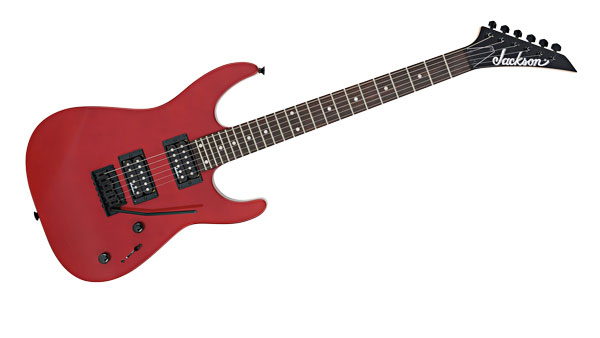MusicRadar Verdict
This is a quality guitar that outshines many similarly priced starters - if you'd handed this to us when we were first learning, we'd have been thrilled.
Pros
- +
Construction is of a higher quality than price would suggest. Performs admirably for a starter guitar. Superb value for money.
Cons
- -
Pickup selector and tuners feel a little flimsy.
MusicRadar's got your back
The JS series represents Jackson's most affordable models ever - you can bag any of them on the street for under £300 - thanks to Chinese construction, but they don't skimp on quality.
"Plugging in is where cost-cutting can reveal itself, but the JS12's high-output humbuckers chug along nicely"
With two own-brand humbuckers and a two-point non-locking vibrato, we're deep in starter territory here, but while the pickup selector and tuners feel a little flimsy, everything else about the JS12's construction points towards a much more expensive guitar. And crucially, it retains tuning well, even with plenty of vibrato abuse.
When you're first learning, a low action can really speed up your progression, and judging from our review model's slinky playability, the JS12 won't give you any problems in that department.
But while it doesn't feature the compound radius of our other review models, the 305mm (12-inch) fingerboard camber has stood Gibson in good stead since the 50s, so you won't find any complaints from us here.
Plugging in is where cost-cutting can reveal itself, but the JS12's high-output humbuckers chug along nicely, although the bridge's proud saddle screws make palm-muting a tad uncomfortable.
While the pickups have plenty of low-end, the highs are a little lacking, and individual chord notes can struggle to cut through.
That rolled-off treble pays off for clean tones, however, doing away with the thin, ice-picky nature of some lower-end axes, instead offering clear, punchy tones.
Want all the hottest music and gear news, reviews, deals, features and more, direct to your inbox? Sign up here.
Mike is Editor-in-Chief of GuitarWorld.com, in addition to being an offset fiend and recovering pedal addict. He has a master's degree in journalism, and has spent the past decade writing and editing for guitar publications including MusicRadar, Total Guitar and Guitarist, as well as a decade-and-a-half performing in bands of variable genre (and quality). In his free time, you'll find him making progressive instrumental rock under the nom de plume Maebe.

